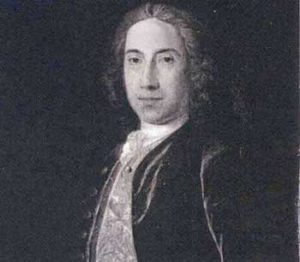
Richard Oswald
*The birth of Richard Oswald is affirmed on this date in 1705. He was a white Scottish merchant and slave trader.
Richard Oswald was born to the Reverend George Oswald of Dunnet and his wife, Margaret Murray. At age 20, he was apprenticed to cousins who were merchants in Glasgow, the brothers Richard Oswald of Scotstoun and Alexander Oswald, sons of the Rev. James Oswald. As a young man, he worked for them as a factor, traveling in America and the Caribbean. In 1741 he became a partner in the Glasgow firm.
Merchant
In 1746 by doing business during the War of the Austrian Succession, Oswald established himself in commercial business in London. He leased a counting house where he initially devoted most of his time to shipping and trading tobacco. He took on a forage contract for the British Army, having in 1756 the merchant James Buchanan as guarantor. He also prospered as a contractor during the Seven Years' War, particularly in the supply of bread in the German theatre, and was praised by Ferdinand of Brunswick. In 1759, Oswald bought the Cavens estate in Kirkcudbrightshire and the Auchincruive Estate in Ayrshire. He made large land additions to both estates in the following decades. In British North America, he had large landholdings and owned slaves in East Florida, and held estates in both Georgia and Virginia. He ran down these holdings during the American War of Independence. He also owned plantations in the Caribbean.
Influence
Oswald was instrumental in directing British businessmen to promise locations in America for growing rice and indigo. Oswald directed to locations in the colony of East Florida for his plantations. He urged East Florida's Governor James Grant to make generous land grants to whom Oswald called his "worthy friends" to whom he owed "particular obligations." Oswald put together deals with investors with good connections, raising his social standing. In his petitions to the Board of Trade and Plantations for settling Nova Scotia plantations, for instance, he demonstrated an ability to bring together groups acceptable to the King. Those he put forward for Nova Scotia included: a former governor; a cartographer; a Member of Parliament; an MP and Paymaster for the Marines; a judge of the Marshalsea Court; and a brother-in-law of the Marquess of Granby. This formula of connecting powerbrokers was a key to his success. He was an advisor to the British government on trade regulations and the conduct of the American War of Independence. He is best known as the British peace commissioner who, in 1782, negotiated the Peace of Paris.
Slave Trader
In 1748, a consortium of Alexander Grant and Oswald, with Augustus Boyd, his son John Boyd, John Mill, and John Sargent, purchased Bunce Island on the Sierra Leone River. The Royal African Company had erected a fort there. Oswald and his associates gained control of other small islands through treaties and established on Bance Island a trading station for factors in the trafficking of African people. Oswald's extensive network of business connections served him well in building his slave-trading empire. The Company of Merchants Trading to Africa formed at this time had some close links to the Bunce Island consortium. Richard Oswald died on November 6, 1784.
